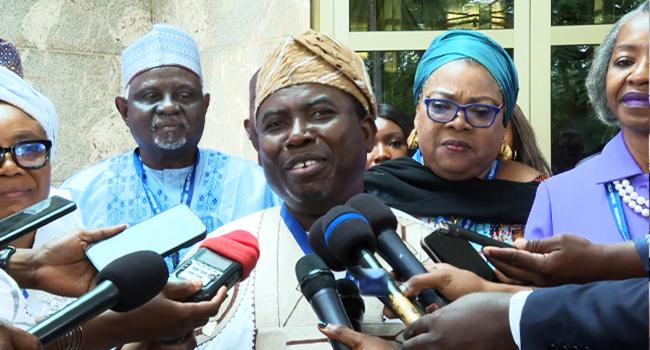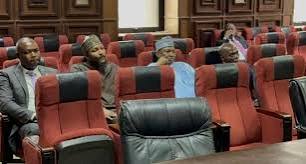The Manufacturers Association of Nigeria (MAN) said on Wednesday that at least 335 companies were distressed in 2023 while 767 manufacturers ceased operations across the country.
This occurred against a backdrop of worsening investment conditions due to growing inflation, volatile exchange rates, and other economic issues.
MAN said this in a statement denouncing the Federal Government’s recently implemented Expatriate Employment Levy.
The group expressed its shock at the levy’s inconsistency with President Bola Tinubu’s Renewed Hope Agenda.
MAN claims that there are enormous unanticipated negative effects on the manufacturing sector that cannot be justified at this clearly depressed moment in our economy.
The statement said, “The manufacturing sector and the economy as a whole may be impacted by the imposition of EEL.
“This will thus result in an unjustified and unparalleled increase in the expenses associated with conducting business in Nigeria, particularly for manufacturers.
“Multifaceted difficulties already plague the manufacturing sector. 335 manufacturing enterprises went bankrupt and 767 closed their doors in 2023.”
The statement also said the sector’s capacity utilisation has dropped to 56% as a result of growing interest rates and a lack of foreign exchange needed to buy machinery and raw materials.
T”The real growth has decreased to 2.4% and the inventory of unsold finished products has increased to N350 billion.”
Additionally, MAN expressed worry that the EEL goes against the terms of our international trade agreements.
Nigeria is party to the African Continental Free Trade Area agreement, which aims to facilitate the free flow of skilled labour around the continent in conjunction with non-discriminatory policies towards other Africans.
The group voiced concern that the imposition of the charge may lead to reprisals against Nigerians employed in other countries of Africa and the world, impede attempts at regional integration, and paint Nigeria as the victim of her peers.
“We are also concerned that the introduction of such a fee through a Handbook, rather than a legislation passed by the National Assembly, might have significant effects on our country’s economy and possibly put pressure on our currency.
“If this levy is not reversed, the Federal Government may be subject to numerous lawsuits that would divert attention from the task of rescuing the current dire situation of our economy,” MAN said in the statement obtained by Persecondnews.
MAN recommended that the president issue an order to halt the application of the Expatriate Employment Levy.
The Federal Government’s new Expatriate Employment Levy policy seeks to eliminate pay disparities between foreign workers and Nigerian labourers while promoting talent transfer and hiring competent Nigerians in foreign-owned businesses.
For employees, the new levy is $10,000, and for directors, it is $15,000. Compared to the $2,000 that foreign nationals paid for the Combined Expatriate Residence Permit and Alien Card, this is a substantial change.
NBS reports that just 59% of occupations in Nigeria are held by Nigerian natives, and that their earnings make up less than 45% of total pay. Additionally, expatriates often earn basic salaries that are more than 45% higher than the national average.
Members of Nigeria’s Organised Private Sector, however, have sharply criticised the EEL’s implementation, claiming that it would have a detrimental impact on foreign direct investments in the nation.
The Lagos Chamber of Commerce and Industry expressed alarm in a statement signed by its Director-General, Chinyere Almona, regarding the possibility that foreign investors will believe that the Nigerian government is intolerant of foreign labour.
The chamber voiced worries that this impression might undermine our efforts to attract inflows of foreign direct investment.
One passage from the statement said, “The Expatriate Employment Levy may have unforeseen consequences that lead to the relocation of foreign companies to neighbouring countries that offer a more favourable and affordable business environment.”
“The implementation of this tax would incite other nations to retaliate by levying taxes on immigrants, with a focus on Nigerian labourers in particular. Remittances from Nigerian workers living abroad will therefore be impacted by this.”
Similarly, the new policy direction was attacked by the Centre for the Promotion of Private Enterprise in a statement signed by Muda Yusuf, the organization’s chief executive officer.
According to the Centre, the strategy might represent a significant setback for the goal of continental economic unity.
“There are serious implications for Nigerians living abroad,” the statement stated. Nigerians living abroad may be impacted if other nations take retaliatory action in response to the policy.”
According to The Glitters research, “there are currently over 17 million Nigerians working in various fields across the globe, including education, health, medicine, sports, media & entertainment, leadership & politics, finance, science & ICT, transportation, tourism, industry, and agribusiness.”






































Leave a comment